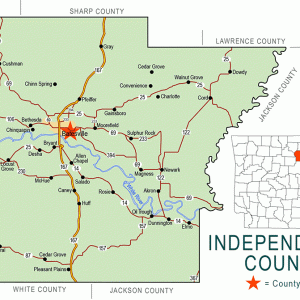calsfoundation@cals.org
Paroquet (Independence County)
Paroquet, located near Newark (Independence County) and the Black River, was named for a now extinct American bird, the Carolina parakeet (Conuropsis carolinensis), which had been found in dense forests, along rivers, and in swamps in North America and especially in Florida and the Carolinas. (Paroquet is an older spelling of “parakeet.”) The Carolina parakeet was also plentiful in parts of Arkansas in the early 1800s and most likely inhabited the swampy regions along the Black River. The species was declared extinct in 1939.
Paroquet is located at the intersection of Paroquet Road (Sandman Lane) and Duck Puddle Road approximately five miles east-southeast of Newark and about three miles north-northwest of Jacksonport (Jackson County), the location of the confluence of the Black and White rivers. At one time, Point Ferry crossed the Black River, connecting Paroquet with Jacksonport. A bridge was later built across Black River near Paroquet.
Perhaps Paroquet’s most famous resident was Thomas Todd Tunstall, riverboat captain on the White River and the man credited with founding Jacksonport. One of the leading citizens of the county, Tunstall owned and managed a large farm along Dota Creek, where he bred and raced horses on his own racetrack. He was living in Paroquet, where part of the farm was located, when he died in 1862 during the Civil War.
Thomas Tunstall’s third wife was Elizabeth Magness Tunstall, a member of the family who helped found Magness (Independence County). Their son, Harrison Magness Tunstall, married Melissa Louisiana Baker, daughter of Peter Kennel Baker. Peter K. Baker and his family moved from Tennessee to Independence County in November 1856, where he bought 160 acres of bottom land around Paroquet, later increasing his land holdings to 530 acres. Peter Baker and his sons became prominent cotton farmers of the area.
During the Civil War, Paroquet was located on the main road from Batesville (Independence County) to Jacksonport and found itself in the middle of the conflict, most notably on July 8, 1862, at Paroquet Bluff (a.k.a. Little Paroquet Bluff) on the Black River where the Orient Ferry was operating at the time. In what became known as the Skirmish at Orient Ferry (a.k.a. the Skirmish at Paroquet Bluff), Colonel George H. Sweet of the Fifteenth Texas Cavalry traveled east from his base in Batesville to make a surprise attack on Captain William Creitz of the Fifth Kansas Cavalry, who was ferrying his supply wagons across the Black River to join Major General Samuel R. Curtis’s Army of the Southwest marching across eastern Arkansas toward Helena (Phillips County). The Texans’ shotguns proved no match for the rifle-wielding Kansans who were guarding the wagons, and Colonel Sweet’s forces retreated in disorder back to Batesville.
Paroquet was known by that name since the days of settlement before the Civil War, but the name became official around 1883 when Paroquet became a whistle stop for the St. Louis, Iron Mountain and Southern Railroad line. Railroad magnate Jay Gould bought the railroad in 1881. At that time, the railroad built a depot at Paroquet and at Magness about seven miles west-northwest of the town. The railroad also built a swing bridge across Black River at Paroquet.
A general store/post office sprang up along the tracks, with Joseph A. Anshutz appointed first postmaster on October 2, 1884. The Paroquet School was built by 1900 and eventually provided for students from first grade through the eleventh. The Paroquet store and post office closed in 1929. White Church on Duck Puddle Road near where the old Paroquet post office stood is still active but has a Newark address.
The time period the post office operated was the heyday for the railroad town of Paroquet, but even then it was mainly an appendage of Newark. Independence Steam Electric Station, a coal-fired electric-energy-generating plant consisting of two units—constructed by Arkansas Power and Light Company (AP&L, now Entergy Arkansas) near Newark—was put into service in 1983 and 1984.
In 1948–49, the school became part of the Newark Public Schools. In 2004, the Newark Schools merged with the Cord-Charlotte School to create the Cedar Ridge School District. The once thriving community of Paroquet is now extinct, like the bird it was named for. Farmland covers the area where the old depot used to be.
For additional information:
Biographical and Historical Memoirs of Northeast Arkansas. Chicago: Goodspeed Publishing Co., 1889.
McGinnis, A. C. “A History of Independence County, Ark.” Special issue. Independence County Chronicle 17 (April 1976).
Kenneth Rorie
Van Buren, Arkansas







My family.
I visited this area last year with a gentleman friend who grew up at Paroquet, Bobby B. Langston. Some of his children, grandchildren, and great-grandchildren met us in Batesville and he organized a tour for them. I’m sad to report that he died February 24, 2023, at his home in Wichita, KS, at age eighty-one.